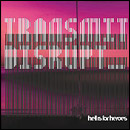That Elizabeth Anka Vajagic’s worn voice on ‘Stand with the Stillness of this Day’ is mixed so high and so clear seems a bold move. Bold because her sentiments are those one tends to play down and conceal: her debut album (as its title suggests) has all the soaring common to a funeral.
Its opener ‘With Hopes Lost’ sets the tone in an urbane manner, a self-pitying moan rolling over a measured cello burr to a piano line that - I believe - might emanate from the shadows of a bar strewn with the butts of cigarettes and lit with their coals. The images this album conjures are all as trite. As affected as Vajagic’s voice (reminiscent of a more melodramatic 'Rid of Me'-era PJ Harvey) and her storming accompaniments (reminiscent of Constellation – from the squalling rock band deconstruction of the latter half of 'Where You Wonder' to the ‘thunder noises’ accredited in the liner notes of the record). Clichéd and affected it is. But the album does circumvent such criticism - it has a neat line in 'numbing everything else'.
And it does so via sheer weight of feeling, which finds its rationale in the words preceding the quote above; 'I saw your face when you killed yourself'. It is at this point it becomes clear what the record is documenting and this point that Vajagic’s (otherwise... rather damn mundane) vocal desire to visit Iceland and revelation that she 'sleeps alone' make a stirring, human sense that sometimes words alone whether fact or fiction (and even at their most simple) can express.
And yet the presence of such more obvious elements as Beckie Foon’s cello and Efrim Menuck’s harmonium – even Vajagic’s voice as an emotive instrument rather than a medium of communication - cause the record’s personal subject matter to be concealed and the album to be universalized into something which on casual listening is little more illuminating than Yanqui U.X.O (the bombs! turmoil!). Still, the arrangements are vital for while the record’s themes of alienation and loss benefit from closer 'Sleep with Dried Up Tears' consisting of just vocals and blunt guitar, the song is too direct to convince that stripped of all its instrumentation 'Stand with this…' would have been arresting as it is - rather 'excruciating'. You do the math.
Thing is, see, is if the effect of the density of the album is to make it oblique and guarded these are the facets it requires - the reasons it is quite so beautiful. It is because the music holds the listener at arms length that the words Vajagic mumbles are as important as the ones she enunciates with a tortured clarity as, desirous to find the record’s heart and message, those are the words which draw us back. Back to a bold album with a heart and soul which and which and which and which (and this is vital!) are there, and are worth looking for.
-
7Daniel Hayward's Score






















